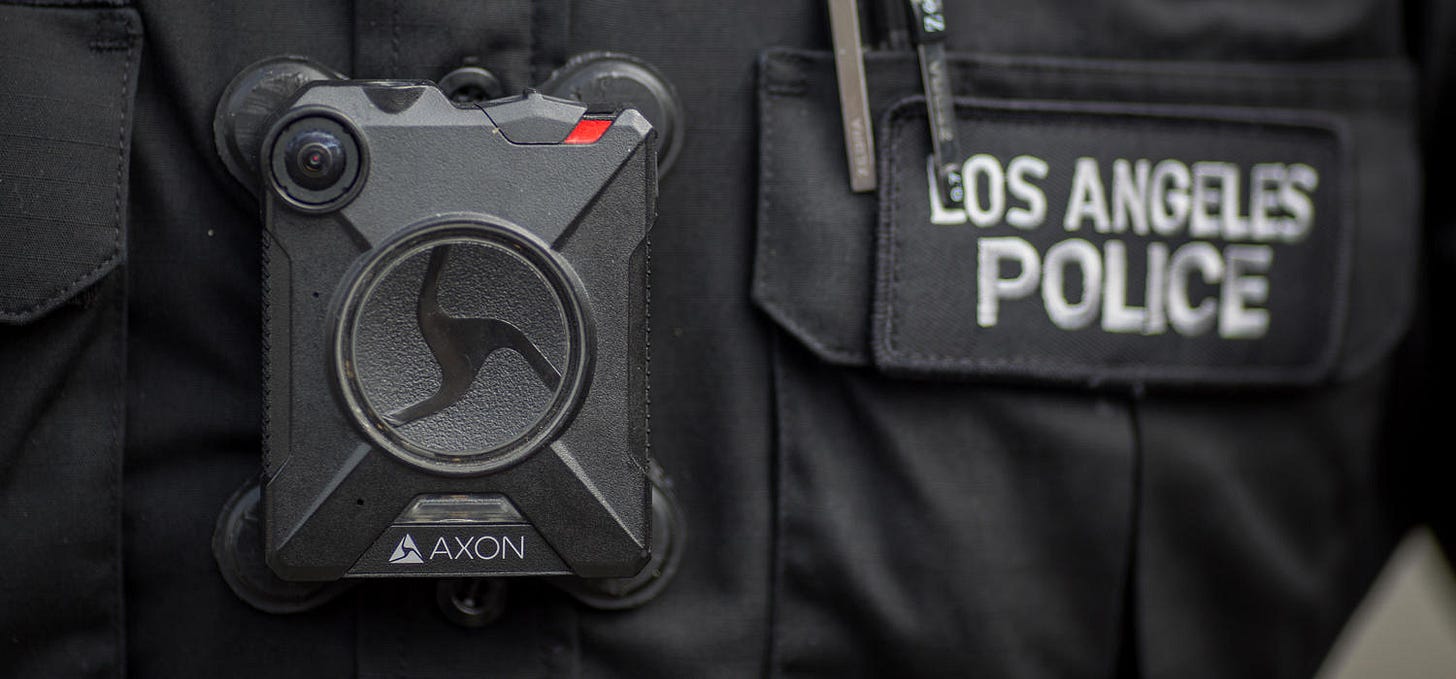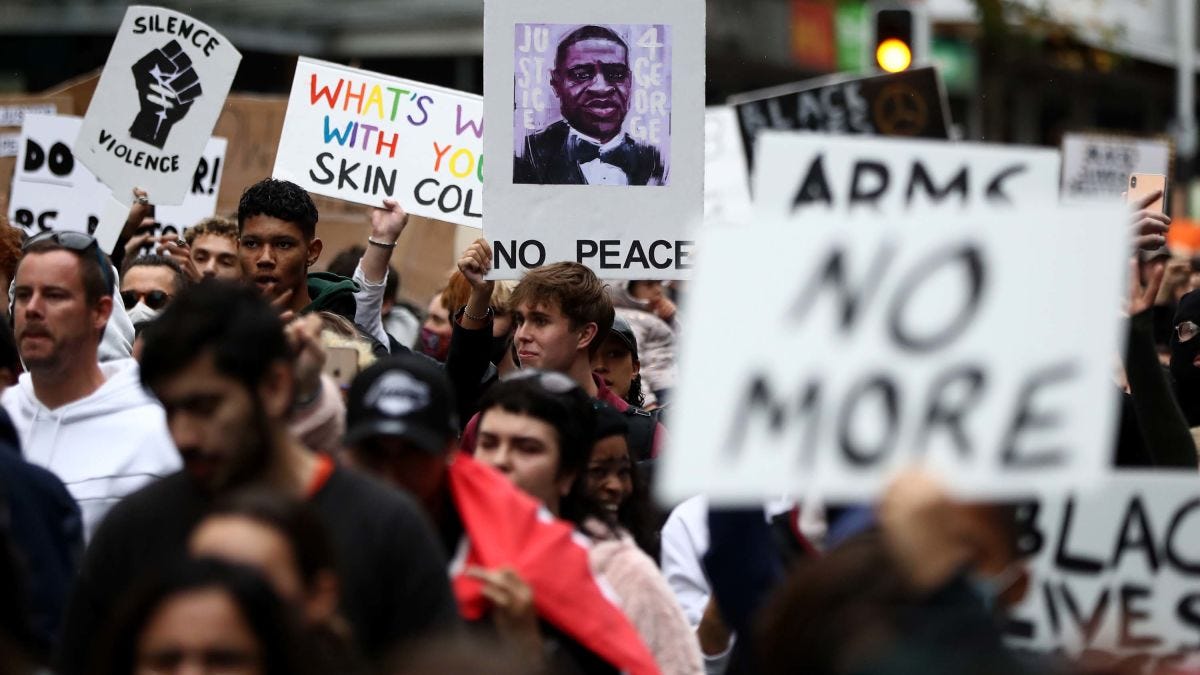Where are we at with body-worn cameras in policing?
A conversation with researcher Ian Adams about the fledged technology's role in criminal justice reforms.
Police brutality has always been at the center of political discourse in recent years. This year, the deaths of Ahmaud Arbery, Breonna Taylor and George Floyd pushed the black lives matter movement to a new culmination, and many took to the streets to protest police brutality and to demand urgent changes.
Currently, public officials across the United States are considering major reforms to address the entrenched institutional biases that have influenced policing policy and interactions with Black and Hispanic community members. Whlie some reforms focus on defunding certain departments or restructure data collection process, another important aspect should not be ignored - the implementation of technology in policing.
As one of the latest examples of law enforcement’s adoption of surveillance technology, body-worn cameras are gradually maturing into the policing in many law enforcement agencies - especially the larger ones. As divided as the conversation about police empowerment is, there is generally an inclination to the use of body-worn cameras in policing. However, policymakers, legislators and technology professionals need to work together to come up with a better framework to ensure the success of this technology.

I spoke to Ian Adams, a Ph.D. Candidate in Political Science at the University of Utah and researcher of body-worn cameras, about the technology’s application in policing. His research includes the consequences of work-place surveillance on front-line public employees, which is also detailed in his studies of body-worn cameras in policing. Edited excerpts:
What’s the progress in implementing body-worn cameras at this moment?
Body-worn cameras have diffused rapidly across the U.S. In five years, we went from almost nothing to 60% of the police department having those cameras. And the technology has been adopted faster at larger law enforcement departments - those appear more often in the news - than the smaller ones (there are about 18,000 law enforcement agencies in the country).
Is it expensive?
Body-worn cameras themselves are fairly inexpensive. But running a body-worn camera program can be very very expensive. Agencies are more caught in budget issues around the storage, review, or auditing of the footage. The base rate that you can expect as an agency is to spend about $100 per month per officer to just store footage. And that cost goes up quickly.
Has the implementation of body-worn cameras been successful?
Body-worn cameras did come about with help from former President Obama, when he formed a task force in 2015 that strongly recommended body-worn cameras as an approach to fixing the gap between community expectations of transparency and openness and policing.
While the expectation was to decrease the police’s use of force and citizen complaints, a lot of research in the intervening five years showed mixed results. In some places, we find a small reduction in the use of force and complaints. But in other places, we don't find any effect, or we find effects in the other directions, including the increased use of force, or other unintended effects.
Overall, the story of body-worn cameras is quite complicated, because the expected outcomes just didn't really consistently appear. The largest body-worn cameras study thus far in Washington, D.C. studied over 20 different outcomes, everything from use of force to arrest rates, convictions, complaints, etc. And they found exactly zero effects across all those outcomes. The reviews of that study also suggested very mixed results, and that perhaps we need to recalibrate our expectations about what technology can do or what this particular technology can do in that area.
What are some other unintended consequences of BWC?
A community research we did in 2016 (when BWC was new) found that officers who wore body cameras, compared to those who didn't, were generally reporting higher levels of burnout or emotional exhaustion, and lower levels of perceived organizational support. What the research tells us is that early on, technology often has unexpected effects on the people at whom that technology is directed.

What are some ethical concerns surrounding BWC?
One of the things that we need to be concerned about is how we frame policy around body-worn cameras. One way to think about body-worn cameras is that they're watching the police. But another way of thinking is that police are acting as a “tripod” for the camera, and the camera is facing outwards, towards the public. So there are ethical concerns surrounding who gets recorded, when they get recorded, and how that footage is made public.
My co-author and I had a early research in 2017, which called for careful ethical consideration of the effects of the cameras on victims of sexual and domestic violence. These are people who are particularly vulnerable to some of the unintended harms that can come from body-worn camera footage. Another population that can be at risk in that would be women on probation and parole. They are already subject to heightened state scrutiny through the conditions of their probation or parole, but they're also far likelier to be the victims of sexual and domestic violence, and far less likely to want to report that to the police. They might fear that police interaction and recording could somehow put them more at risk.
I've been happy to see many, many communities take those ethical concerns seriously. The camera actually records far more non-police when it does for police. And so we can't fall victim to the trap of thinking that body-worn cameras are a really discreet tool to surveil police officers. In fact, they record many members of the public in many very vulnerable positions. So we need to craft our body-worn camera policy in such a way that it protects those people as well.
What are the policy and legislation solutions to those concerns?
You can craft protections on the policy side by enhancing the discretion of officers to turn on the camera in the first place. So your light policy that it suggests, ‘don't turn on body-worn camera in the hospital setting,’ ‘don't turn on a body-worn camera, when you're responding on the first report of a sexual assault or rape.’ So those are policy-worn solutions. But there are also legal solutions on the post-recording side. You can imagine creating loopholes in public records laws. So in some states, like Washington, they have very strong laws that demand the release of any public records to anyone that requests it. A body worn camera’s video is a public record. So we need protections within those laws to make sure that, for instance, the suspect in a sexual assault or domestic assault or friends and family of that suspect isn’t given access to that video.
What are some of the current aspects of BWC you are working on?
Some of the newer aspects of body-worn cameras are around how and when they get activated, and who and where their footage is reviewed. So Axon (body-worn camera company) just announced that they're rolling out some new artificial intelligence tools to review body-worn camera footage, and flag it if the algorithm picks up anything of concern. That's a very new technology that they've been working on for several years. But algorithms and artificial intelligence are subject to the same human biases as the people who programs. So we need to be very careful when we're thinking about trying to solve our very human problems with very inhuman tools.
What is technology’s role in reforming criminal justice systems or policing, and how successful it is?
Many things we take for granted today were all products of technologies developed in the past 100 years - fingerprints, mugshot, photography. Technologies have been both successful and failures in their intended reforms. And it's often not smooth progress. But overall, it's been a story of success, from the research area, they generally reduce the risk of injury to both officers and people they're interacting with. But that's not to say that there haven’t been terrible outcomes in some cases.
Body-worn cameras have not shown thus far to be a consistent successful technological intervention. That may not hold true in the future. We don’t know. There are still many active research agendas around that in the world.
And I would suspect, that we'll soon see body-worn cameras moving into areas outside of policing. I know in some small test areas they're being used in corrections, public education, or public transportation. So anywhere where you find public employees, interacting with the public, and where there's concern about how those public employees are behaving on the job, you're likely to find a market for body-worn cameras.
We measure a technology’s success depending on what your expected outcome is for a technology, that is, how you define what you want out of the technology. Although for a researcher like me, I’m often interested in the unintended consequences of this technology, and that people can often be left feeling like the trade off wasn't worth it. But in general, there are lots of other technologies being developed at this moment and it’s too early to make any judgments about how successful they will be for criminal justice.
Have criminal justice reforms been successful so far?
When we say reform, policing is pretty much constantly in some state of reform. as is most of our public sector, Americans love the idea of reform. The experience, though, that we generally have, can sometimes fall short.
A couple weeks ago one of my students ask me ‘why is it so hard to implement reforms in law enforcement or criminal justice?’ We've actually seen a tremendous amount of reform in law enforcement and criminal justice for many decades. The real question is ‘are we getting what we want out of those reforms?’ And there's a big gap between even what we mean when we - the public or different parts of public - talk about reform. So I think as an initial step, we have to try to define what we want out of criminal justice, out of policing and out of those reforms.






Insightful